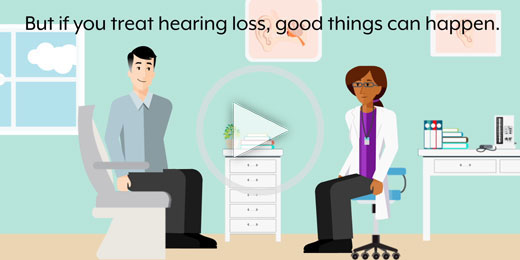Most people who have hearing loss aren’t born with it. Instead, hearing loss is acquired, typically caused by exposure to loud noises, aging, or some combination of the two. For most, hearing loss is normal and natural — a tradeoff to living a long and fulfilling life.Research shows human hearing is at its best between the ages of 18-25, and age-related hearing loss usually starts becoming noticeable around age 50. In fact, the prevalence of hearing loss doubles for every decade of life, which explains why one out of three people older than 60 have hearing loss, two out of three over 70 have it, and four out of five people 85+ have hearing loss.
You should test it.
If you’ve concluded you have hearing loss — either by exhibiting common signs, which you can find here, or by taking a quick and free hearing test, which you can find here — the good news is that help and treatment are readily available.
See what you should do if you have hearing loss.
You should treat it.
Study after study have linked untreated hearing loss to an array of issues like depression, anxiety, increased risk of falls and hospitalizations, and even dementia. But doctors and scientists from institutions like Johns Hopkins Medicine and Columbia University have long noted that treating hearing loss can help, and that “hearing aid use has been shown to improve the social, functional and emotional effects of hearing loss.”
You should visit a professional who specializes in hearing healthcare.
When you are ready to deal with your hearing loss — and Johns Hopkins’ Dr. Frank Lin recommends treating it “before brain structural changes take place — you can start with your doctor or general practitioner (GP), who will most likely refer you to a hearing healthcare professional. Or, you can go directly to a hearing healthcare professional, like an otolaryngologist (ENT doctors), audiologist or hearing aid specialist.
What to expect at your appointment.
While not every practice or clinic will do things exactly the same, you should expect some common procedures when you go in for your first visit.
- Fill out paperwork — including intake papers with health history and hearing questionnaire.
- Complete a hearing evaluation — which typically includes a visual inspection of your ears and a hearing test in a sound booth.
- Review of your audiogram — the results of your test will be in the form of an audiogram, which is a graph that measures your specific hearing loss.
- Discussion of treatment and next steps — which may include a technology demonstration and hearing aid recommendation.
Hearing aids are successful in treating most hearing loss.
If hearing loss is confirmed during your appointment, hearing aids will most likely be recommended.Hearing aids are by far the most common way to treat hearing loss. They can help 90-95% of people who have hearing issues, especially if the hearing aids have been fit by an experienced professional, and programmed and customized to the individual’s unique hearing and lifestyle needs.
Not all hearing aids are the same.
Today’s hearing aids come in many styles and offer a range of advanced features.There are “invisible” hearing aids that fit deep inside your ear canal — so small barely anyone can see them. There are hearing aids that sync to your iPhone, so you can take phone calls and listen to music, podcasts or videos wirelessly through your hearing aids — and even control and adjust your hearing aids remotely using your iPhone.And the best of today’s hearing aids — Starkey’s new Muse and Halo 2 hearing aids — are the first to feature technology designed to make listening to music more enjoyable and natural than ever before.
The provider you pick will become your better hearing ally.
It’s important to pick a hearing healthcare provider you like and trust. The two of you will work closely together to get just the right hearing aids for you — which will be based on many factors including your degree of loss, personal style and feature preferences, how active you are, and more.He or she will also be your go-to expert for better hearing tips and advice, hearing aid tune-ups and maintenance, or just to answer any questions you have about this important and wonderful sense.Most importantly, the hearing healthcare professional you pick will become your better hearing ally — the person you can lean on to help ensure that your hearing loss never slows you down or prevents you from living a full and happy life.Ready to proactively tackle your hearing loss? Contact South Suburban Hearing Health Center to schedule your first hearing consultation!

